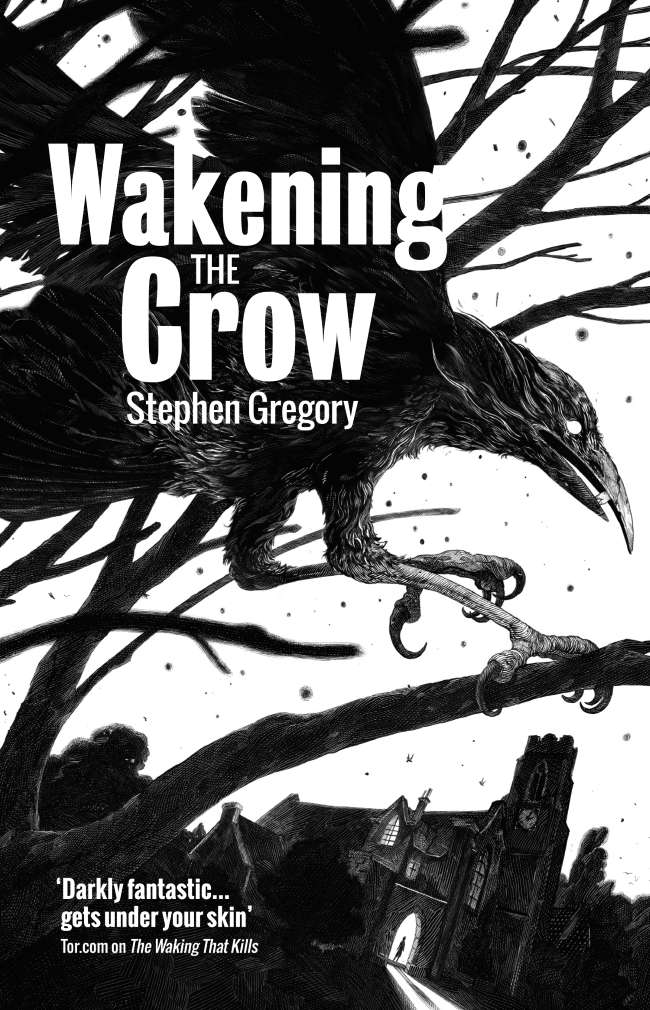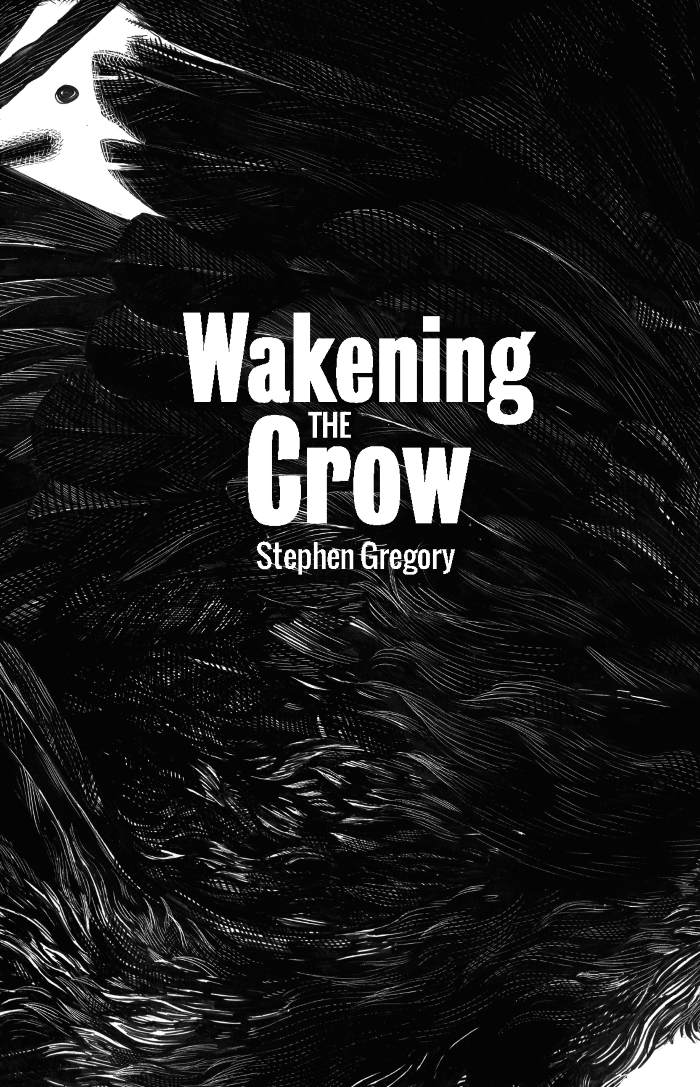Wakening the Crow



First published 2014 by Solaris
an imprint of Rebellion Publishing Ltd,
Riverside House, Osney Mead,
Oxford, OX2 0ES, UK

ISBN: 978-1-84997-856-9
Copyright © 2014 Stephen Gregory
Cover art by Nicolas Delort
The right of the author to be identified as the author of this work has been asserted in accordance with the Copyright, Designs and Patents Act 1988.
All rights reserved. No part of this publication may be reproduced, stored in a retrieval system, or transmitted, in any form or by any means, electronic, mechanical, photocopying, recording or otherwise, without the prior permission of the copyright owners.

for Tony and Rauni, with love
Prologue
C
HLOE HAD HER
tongue stuck onto Robin Hood’s thigh.
She’d run off as soon as we turned the corner and she saw the statue ahead of us. Before I could call out to stop her, she’d leaned up to lick the smooth green bronze, and her tongue had stuck.
January 11th, one of the coldest days in memory. In the shade of the castle gatehouse, it was minus five or six. The cobbles were gleaming black ice. The ivy on the castle wall was frosted hard, as though cast in the same bronze as the statue, and the pansies in the municipal flower beds had collapsed into lifelessness.
Why do children want to lick everything? Why do they need to explore their strange new universe by licking? And Chloe, not an inquisitive toddler anymore but a bonny seven-year-old, why was she still wanting to stick out her tongue and...?
I ran up to her, a bit out of breath because the air was so sharp in my throat, a bit wary on the treacherous cobbles and nicely fuddled by the beer I’d had in the Ye Olde Trip to Jerusalem. She was moaning, half afraid and half laughing. She had her tongue pressed on the outlaw’s bare, muscular thigh, it had stuck because of the cold and she didn’t dare move. But with my arms wrapped around her, my face in her hair and her funny red bobble-hat, we both started giggling and I was muttering for heaven’s sake Chloe what on earth are you doing, and my beery breath was close to her bluey-chapped lips and her mouth which smelled of the chips we’d had in the pub...
Together we thawed the air enough to unfasten her kiss from the freezing metal.
We sat on the edge of the flower bed and we giggled and snuggled. She pushed out her tongue at me, and it was raw where the ice had burned her. She stared into my face, she smiled her blank, angelic smile, and she said nothing.
Chloe, a perfect, silent angel. She hadn’t said anything for nearly a year.
This was one of her favourite places. Our little day out together: a morning on the boat, then a walk from the canal to the pub for lunch, and afterwards up the hill to the castle gatehouse and hugging the legs of the Robin Hood statue. Down to Broadmarsh and the bus station and a bus back home. Oh, and I might drop in to see what odd and occult treasures Mr. Heap might have saved for me.
Heaps. I said Heaps, she seemed to recognise the word and she tugged me away from the derelict flowers and the looming shadows of the gatehouse; an old corner of Nottingham, where the cobbled streets were narrow and winding against the massy boulder on which the castle was built, by the offices of solicitors and architects with their leaded windows and peculiar turrets... and when I said Heaps again, she pulled me into the shop doorway.
It was dark and warm inside. Only a tiny ground-floor, it was a chaotic jumble of books and pictures and engravings and curios. There was a fire glowing in the hearth, and as we tumbled inside and I quickly pushed the door shut, the coals collapsed into a shower of sparks, brightened into flames and breathed a cloud of soot into the room.
The man I called Mr. Heap appeared from behind his desk in the corner. He was very small and thin and wrinkly-ancient, as though he’d been huddling in his shop for decades or centuries and become mummified inside it, smoked and desiccated like the maps and manuscripts he’d accumulated around him. In faded gold letters on the shop window it said Heaps, and I’d never been sure if it referred to this man or the clutter of stuff in his shop. So when he emerged from the darkness and I said, as always, ‘Good afternoon, Mr. Heap,’ and he just nodded, I reckoned, as always, that that was his name.
I poked around. The warmth and the dust seemed to fold around my head and neck, pleasant at first after the sub-zero temperature outside, but then it was too hot and oddly suffocating. I was looking for books, but there was nothing different since our last visit. The buzz of beer in my head, which had been comfortably numbing in the frozen shadows of the castle, was more of a fug, the beginning of an afternoon hangover. I straightened up, from an avalanche of mildewed tomes and tatty paperbacks. Chloe was standing by the fire and staring into it, utterly silent, her eyes gleaming and her mouth fixed into its permanent, lovely smile... lost in thought, lost somewhere, lost in the locked-away memories she’d inhabited for the last nine months.
‘She doesn’t say much,’ Mr. Heap said.
‘She doesn’t say anything,’ I said. ‘She just smiles.’
The man angled his head towards the little girl, frowned and then squeezed his eyes shut as though he was trying to remember something he’d heard or read a long long time ago. And then, reading my own thoughts and echoing them almost exactly, he murmured, ‘She seems lost... and yet, even with the utterly lost, to whom life and death are equally jests, there are...’ and he paused, opened his eyes and blinked at me and muttered, ‘I can’t remember, it’s a quote from somewhere or someone.’
To lighten the moment, because on several of our previous visits to his shop the old man had commented on Chloe’s silence, I ventured to tell him how she’d stuck her tongue onto Robin Hood’s thigh and maybe that was why, today, she was so quiet. He smiled, disbelieving. He made a dry chuckling noise in his throat, and for the first time I saw that, among the reptilian wrinkles of his skin, there was a flicker of mischief in his eyes and on his lizard lips. Chloe heard him. She swivelled her head and held him with her gaze for a few seconds, before turning back to her communion with the fire.
‘Come on then, Chloe,’ I said at last, putting my hands on her shoulders. ‘Let’s not get too cosy in Mr. Heap’s shop. It’s going to get dark outside and even colder, and we’ve got to hurry and catch our bus home.’
Indeed, as I pulled the door open, the fierce air of a January afternoon seemed to pounce into the room. The cold, or another puther of smoke from the fire, provoked the old man into a flurry of movement.
‘Got it...’ he was saying, ‘it reminded me, yes, the utterly lost and all that, I was trying to remember where I’d seen the little girl before. Here, let me give you something...’
He’d rummaged behind his counter and come out with something in his hand. He pressed it towards me, saying, ‘Here, take it, I’d forgotten all about it, but I’ve been keeping it for you and for your little girl and waiting for you to come back again...’
I took it from him. It was a little box covered in black velvet, a jeweller’s box for a ring or a brooch or some other kind of trinket.
‘Go on, take a look,’ he was saying, ‘and hurry up, you’re letting the cold in... it may be something or nothing, but it’s got a story and who knows if it’s true or just a bit of nonsense or...’
I opened the box. Nestling on a bed of silver satin, there was a yellowing fragment of something. Something like bone or horn. A relic? I peered closer, held it to my face, squinted and sniffed, and for a moment, almost put out my tongue to touch it.
‘What is it?’ I said. ‘What’s the story?’
But by then he’d manoeuvred us outside and closed the door. Through the darkened window, I saw him cross to the fire and stand over it, a dim, wizened figure in the glow of the flames, in a swirl of soot.
I snapped the jewel box shut, pushed it deep into the pocket of my coat. I reached for Chloe and squeezed her hand. The ice seemed to nibble at our faces as we hurried down the narrow street and into the brightness of the big city.
Chapter One
N
INE MONTHS
? A year? To be exact, it was last April 3rd, a beautiful springtime afternoon, when Chloe had last spoken... before she’d been touched with a strange, random and rather brutal magic wand which had shocked her into a secret world of silence and smiles.
The last thing she’d said? My wife, Rosie, asked me many times to recount how it happened: what Chloe was doing, what I was doing, what I’d said to her and what Chloe had said. I never told her the exact words, Chloe’s parting pithy words before she was touched by fate and switched off.
April 3rd. It must have been a Saturday because I was looking after Chloe, otherwise she would’ve been at school. A Saturday, yes, and Rosie was at work, her bustling busy-body work as a dental assistant at Dowling & McCorrister, one of the biggest, smartest practices in Nottingham. So I had Chloe. No, not sweet, angelic, utterly amenable Chloe. I had rude, petulant and defiantly uncooperative Chloe. And I was manning, as far as I ever manned anything, Erewash borough council’s mobile library. That was my job of work. Six days a week I drove the library, a creaking, swaying old Commer van weighed down with hundreds of books on their sagging shelves, from one corner of the county to the other, stopping in village car parks and schoolyards, in town centres and leafy lay-bys, parking and waiting and serving the public.
My last words to Chloe, on that April afternoon? ‘Chloe, don’t do that... do you have to do that? Why are you torturing the poor thing? It’s...’
I didn’t mind the job. Five days a week I enjoyed the trundling around and the scenic stops and the odd enthusiasms of my customers. I had time, my own time. I could sit in my travelling room-full of books and brew a coffee or a mug of soup... on breezy bright days and gloomy dark days, on sparkling mornings with the door thrown open or torrential thundering afternoons with the door pulled shut and the van all cosy and steamed up... and I could read. I could fire my own enthusiasms, even if the fire was short-lived and fizzled and smouldered and went out. A dead-end, poorly-paid job, but it was alright, it was a world of my own, for five days a week.